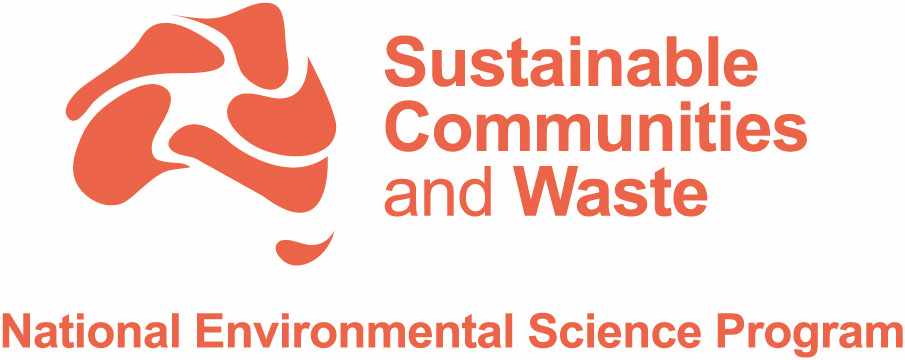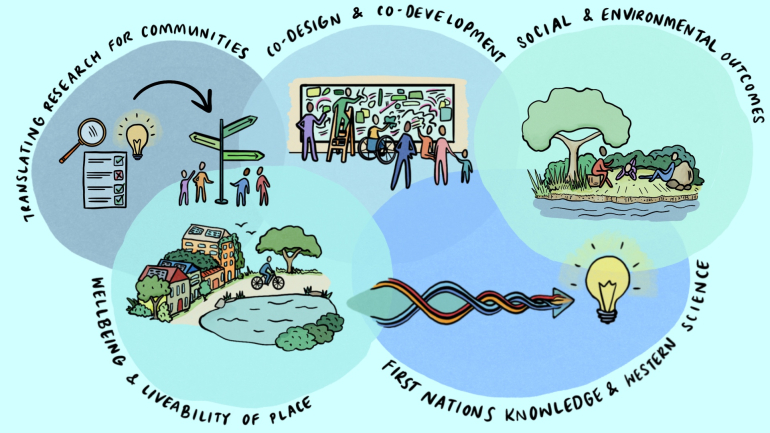The Sustainable Communities and Waste Hub is working with communities, industry, government and researchers across Australia to deliver practical, evidence-based research for a healthier environment and progress towards a circular economy.
For National Science Week, here is an overview of our research:
Impact Priority 1 – Sustainable People–Environment Interactions (SuPErInteract)
This priority develops solutions that help policies and planning deliver sustainable communities and thriving ecosystems. The research is co-designed with local councils, Indigenous communities, environmental groups and policymakers, and is delivered through two key projects:
Nature Connection and Wellbeing
- Exploring how connecting Australians with nature can improve mental health, strengthen communities and inspire environmental action
- Using approaches such as urban greening, nature-based solutions, national surveys and storytelling to make benefits tangible
Water-Sensitive and Liveable Communities
- Promoting culturally appropriate and inclusive water planning, especially in regional and remote areas
- Strengthening First Nations leadership in water management and embedding it into planning and governance
Impact Priority 2 – Plastic and Waste Materials
This research provides actionable solutions to reduce waste, enhance resource recovery and protect the environment, while addressing the unique challenges and opportunities in regional and remote communities.
The work is being undertaken in collaboration with councils, industries, Indigenous communities and policymakers, and delivered through two projects:
- Investigating where microplastics originate and how they move through air, water and soil
- Providing evidence to inform better product design and regulation
Fit-for-Purpose Technological Recycling Solutions
- Identifying recycling technologies suited to the challenges of regional and remote Australia
- Supporting local councils and industries with tools, case studies and policy frameworks to enable circular solutions
Impact Priority 3 – Hazardous Waste and Pollutants
This priority delivers solutions to manage persistent and emerging contaminants in waste and recycled products, protecting human health, the environment and Australia’s circular economy goals.
In partnership with policymakers, industry, researchers and communities, the project:
- Develops transferable guidelines, frameworks and methods to improve understanding of chemicals in waste and recovered resources
- Creates guidance for designing robust sampling and chemical analysis campaigns
- Generates high-quality, traceable data on chemicals of concern in complex waste materials and products with recycled content
- Undertakes case studies on end-of-life tyres, electronic and battery waste, and recycled cable sheathing materials
Impact Priority 4 – Improving Air Quality
This research delivers solutions to improve air quality and reduce exposure to harmful pollutants, developed with Indigenous communities, governments, industry, researchers and public health leaders.
It is delivered through four projects:
- Working with Indigenous communities to understand experiences of smoke from bushfires, cultural burns and household sources
- Co-developing culturally appropriate strategies and public health resources
Air Pollution in a Changing Climate
- Modelling how climate change and emissions reduction strategies will affect air quality
- Conducting reviews and scenario analysis to integrate air quality goals with climate adaptation
- Developing real-world testing protocols for wood heater emissions using Australian hardwoods
- Evaluating policy tools such as incentives and regulatory reform
- Supporting councils with pilot actions and intervention strategies
Evaluating Safe Havens and Low-Cost Sensors
- Assessing safe indoor spaces and clean air shelters for protection during extreme pollution events
- Testing low-cost sensors for community-level monitoring
- Providing guidance for councils and organisations to implement effective interventions
Impact Priority 5 – Circular Economy and Waste
This priority provides tools and insights to support Australia’s transition to a circular economy through better data, governance and policy innovation.
In partnership with policymakers, councils, industry, Indigenous communities and researchers, the work is being delivered through three projects:
Tracking Progress Towards a Circular Economy
- Developing a material flow analysis framework to track resource use and waste generation
- Improving national indicators for circular economy performance
- Supporting decision-making with data-driven insights
Unlocking Circular Innovation in Regional and Remote Australia
- Identifying governance models that support circular economy innovation
- Exploring barriers to local initiatives
- Providing practical recommendations for councils, state and federal agencies and industry
Circular Economy Opportunities for Indigenous Communities
- Identifying opportunities that align with Indigenous knowledge and business models
- Supporting Indigenous enterprises to access circular markets
- Providing policy and funding recommendations to enhance Indigenous participation
Impact Priority 6 - Circular Economy Community Engagement
Designing a circular economy that is inclusive and community-driven is essential to building a more sustainable future. IP6 focuses on exploring how communities, across urban, regional and rural parts of Australia, can participate meaningfully in circular economy initiatives.
- This new scoping study will inform a long-term research program that ensures people, place and participation are at the heart of circularity.
- Insights from this scoping study will be used to design a longer-term research agenda under IP6, focused on participation and community engagement in place-based circular economy solutions.
Through collaboration and co-design, the SCAW Hub’s Impact Priorities are delivering the knowledge, tools, and partnerships needed to protect our environment, support sustainable communities and advance Australia's circular economy.

